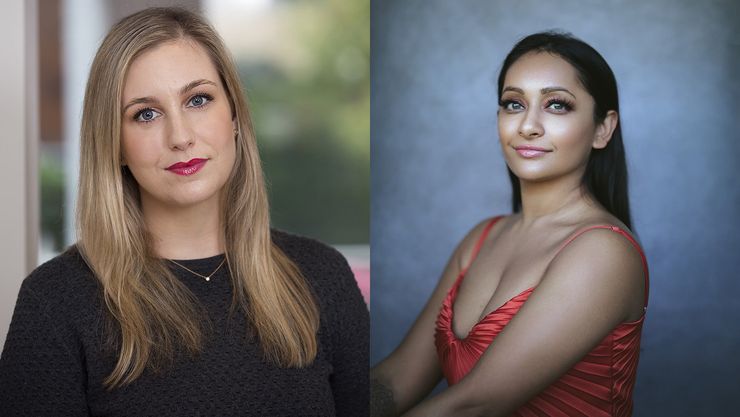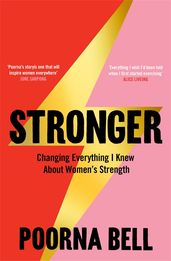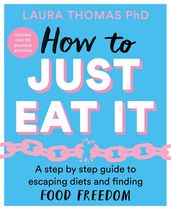Poorna Bell talks strength with Laura Thomas
In conversation with Laura Thomas, powerlifter and empowerment expert Poorna Bell describes her own determination to ditch diet culture and find new strength.

An award-winning journalist, author and competitive amateur powerlifter who can lift more than twice her own bodyweight, Poorna Bell is an inspirational force to be reckoned with.
Having endured unimaginable heartbreak following the loss of her husband, Poorna discovered the world of weightlifting, and with it the ability within us all to tap into our reservoir of inner strength and become our strongest selves both mentally and physically. In her new book, Stronger, Poorna aims to empower all women to use their own physical strength to gain the confidence that has been helping men to succeed for centuries – something that has nothing to do with weight loss or appearance.
Poorna's empowering message goes hand-in-hand with that which Laura Thomas – fellow author registered nutritionist and trailblazer for intuitive eating – is passionate about sharing. In Laura's books, Just Eat It and How to Just Eat It, she explains how we can listen to our bodies to tune into our own hunger and satiety cues and ditch diet culture completely.
Here, Poorna speaks to Laura about her experiences with body image and leaving diet-culture behind, and shares just how building muscle can empower us to make our mental wellbeing a priority.
Laura Thomas: It takes a lot of courage to unsubscribe from diet culture, particularly if it means giving up privilege; what gives you the strength to step away from diet culture?
Poorna Bell: I find that the more I remain unsubscribed from diet culture the easier it gets, because this is probably the most sane I've felt about my body and food, and the longer that continues the more mad diet culture seems in comparison, but having said that, it never feels easy. Not because of my own relationship with my body and mind, which is actually pretty good most days, but it's more the relentlessness from society around you, which – unless you unsubscribe from society and live like a hermit in the woods – is hard to avoid. It's not just what we see on film and TV or magazines, but it presents itself in literally every conversation I have with people.
What keeps me strong is the continual reinforcement of focussing on what my body can physically achieve versus what it looks like, and also reminding myself how diet culture never, ever led to the nirvana it promised, even when I was what society deemed a ‘good body size.’ Also, the more my body changes, whether that's getting bigger or smaller, the more natural it feels, and so my body changing shape is a lot more normal to me now. I also have a phone-a-friend in the form of my sister Priya, and we both always call or text each other when we need reassurance or just a sanity check around things. And then I strengthen my foundation by following people who talk about food and exercise in a way I like, and I unfollow anyone who uses diet culture lingo, which can range from ‘no pain no gain,’ to ‘I went for a run to burn off my Xmas dinner.’
LT: What steps do you suggest people can take to move away from diet culture?
PB: I think once your mind is open to it, it's really hard to unsee it. But opening your mind to it is the big hurdle. I find learning about diet culture and different ways of eating, whether that's mindful eating or intuitive eating, helps. And it's important to get this knowledge from a number of different sources. That could be reading books about it, like your amazing one, and there are so many incredible podcasts that talk about it including Train Happy which is run by Tally Rye who also touches on intuitive fitness.
Also social media has made things so much more digestible for us to understand. So follow people who can teach you about this stuff. I also think give yourself time and kindness around this. It won't happen overnight and in effect you are overturning huge ingrained beliefs so that takes time. And lastly, friends and family are a big one: 99% of people I know talk about food in what I consider to be a problematic way, whether that's assigning good or bad labels, restricting themselves, fat-shaming themselves and so on. I avoid conversations about food with the most problematic of them all, or I just change the topic, or quietly leave the room.
LT: How has intuitive eating impacted your relationship with your body?
PB: I think it has restored a sense of trust in my body, but also means that food doesn't rule my life in the way it used to. I've never been an emotional eater, but I certainly have felt the pressure to avoid certain foods in the past or think that I couldn't eat certain foods and have weird rules around them. Intuitive eating has released some of that and restored a sense of calm.
For transparency I don't always intuitively eat because I'm also a competitive powerlifter and during some training cycles I need to ensure I'm eating a certain amount of protein and carbs for muscle building and recovery, but when I am not doing that, I revert to intuitive eating. When I was ill for ten months during the pandemic and couldn't exercise much I ate intuitively, and having that trust in my body to tell me what it needed felt pretty amazing.
LT: In your new book you talk about all the different ways in which women are strong; if you had to distill it, how would you describe what strength means to you?
PB: Strength for me means being able to use your successes and your failures to keep moving forward in life, and being able to do so in a way that is mentally sustainable, that gives you joy and that allows confidence to flow through every area of your life.
LT: Diet culture teaches us that exercise is about aesthetics: ‘sculpting our booty,’ ‘getting shredded’ and ‘trimming the fat.’ What do you think are the true benefits of moving our bodies and how can we begin to shift our perspective?
PB: Aesthetics are important to most of us because of the society we live in, and it'd be disingenuous of me to say that I don't consider aesthetics when I train. But the problem is that somehow aesthetics have become the most important reason why we exercise. Other things such as mental wellbeing, for instance, should absolutely be at the top of that list. Or things like joy. Or even capability. And the problem when aesthetics are at the top of that list is that all of those other things, that really and truly have a direct benefit to your life, then fall by the wayside.
Consider that many women for instance avoid weights because they don't want to 'bulk up' when literally we're talking about creating muscle that will have a direct impact on their lives by helping them to lift their own bags and move things around without relying on a man to do it for them.
We end up sacrificing a lot in the name of aesthetics, and training in a way that perhaps we don't necessarily enjoy, and then the entire thing feels like punishment and it's hard to sustain. If you completely change that, and start with what you want to achieve in terms of capability and better mental wellbeing at the top, then the rest follows. In terms of shifting your perspective, I'd say try to trace back where your beliefs come from. And very often you'll find these beliefs don't actually have a proper source, they aren't based on fact or science. No gender, for instance, has the monopoly on muscle. Yet we have a society that tells us that men do. Like, who said that? And yet everything in our society is geared around that belief.
LT: What makes you feel most at home in your body?
PB: Just after I've had a massive weight-training session, I feel so proud and happy of what my body does and what it continues to do.
LT: Something that has supported you feeling physically strong is powerlifting – some people, women in particular, might feel intimidated by that. Give us your elevator pitch on why you think more women should get into powerlifting!
PB: Women are more likely to suffer from osteoporosis and experience heart problems when we are over the age of 50. Powerlifting is a great way to build strong bones, and it is a great way of getting your cardiovascular health up in a way that doesn't involve high impact activities such as running. It also comes with an incredible community who are all about helping you to get as strong as possible, and they don't give a shiny sh*t about what your body size is because they celebrate you just as you are.
LT: As well as being physically strong, you’ve been through some really difficult life stuff. How do you look after your mental wellbeing?
PB: Boundaries. I have really strong boundaries around what I commit to, and my relationships with people. Understanding that no one else is the caretaker of your mental wellbeing, and so sometimes you might have to make unpopular choices but ones that will ultimately mean you feel more rested and capable. And lastly, routines for my mental wellbeing are something that I try and take time for on a daily basis. It's not a nice-to-have but a non-negotiable.
Stronger
by Poorna Bell
Poorna Bell’s journey to strength began following the tragic loss of her husband, Rob. She realized that she had been relying on the men in her life to take out the bins, carry the luggage and move furniture. Poorna is now a competitive amateur power-lifter and the strongest she has ever been both mentally and physically, and is passionate about sharing the empowerment she found when she began focusing on what her body can achieve as opposed to how it looks. This inspiring non-fiction book is part memoir and part manifesto, starting a conversation about women’s mental and physical strength and fitness which has nothing to do with weight loss.
How to Just Eat It
by Laura Thomas
Nutritionist and bestselling author of Just Eat It Laura Thomas PhD is back with this practical self-help book to help you reframe your approach to food. She uses the principles of intuitive eating in order to develop a judgement-free attitude to food. Laura also helps us to understand and spot diet culture in the media and society. Her wonderful practice called ‘Diet Culture Bullsh*t Bingo’ involves spotting phrases such as ‘burning off food,’ ‘cleanse’ and ‘80/20 rule’ to help understand and learn to identify diet culture (and how it affects us) in everyday life, social media, TV and even our own language.




